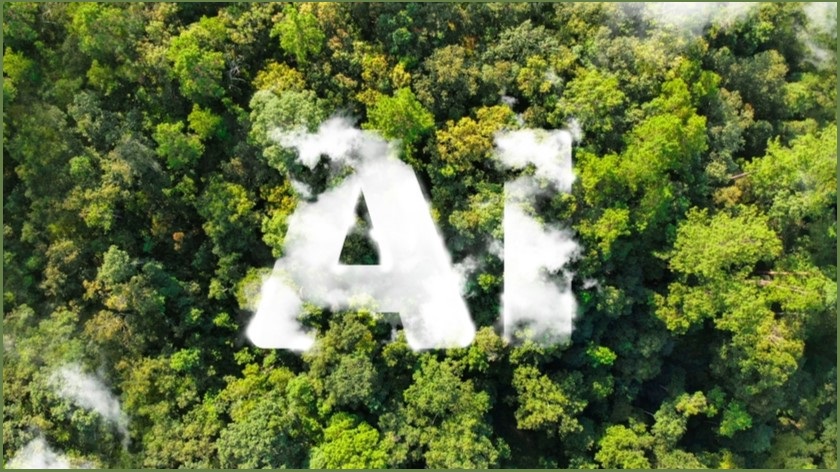A group of more than 120 organisations has signed an open letter demanding industry leaders acknowledge the “true environmental costs” of artificial intelligence and phase out fossil fuels.
As competition heats up between AI giants including Google, Microsoft, OpenAI and China’s widely banned DeepSeek, tech and climate ethicists are increasingly urging industry and policy makers to consider AI’s adverse environmental impacts.
Globally, AI-related infrastructure has been estimated to soon consume six times the amount of water as Denmark, while one request through leading AI chatbot ChatGPT is said to use 10 times the electricity of a Google Search, according to energy policy advisor the International Energy Agency (IEA).
Meanwhile, Google parent Alphabet has observed its greenhouse gas emissions are up a significant 48 per cent since 2019, Microsoft’s are up 29 per cent since 2020, and following the US’ recently declared $796 billion (US$500 billion) database expansion project Stargate, the IEA estimates electricity consumption from data centres, AI and cryptocurrency could double by 2026.
With AI facing increased scrutiny for its climate impacts, over 120+ organisations have signed an open letter urging policymakers, industry leaders and stakeholders to phase out fossil fuels throughout the technology supply chain.
“There is increasing evidence of AI systems driving up emissions and locking in reliance on fossil fuels, while exhausting critical resources like water, land and raw materials, intensifying environmental harms across the technology supply chain, and accelerating the expansion of resource-intensive computational infrastructure beyond sustainable limits,” reads the letter.
Backed by the likes of human rights organisation Amnesty International and AI research outfit AI Now Institute, the letter demands AI infrastructure and data centres be made fossil-free.
Tech companies are being urged to invest “new and additional renewable energy to power new data centres”, end contracts which provide AI to oil and gas industry, and to stop “relying on offsetting” in their energy emissions claims.
Signatories also backed demands for increased transparency around data centre impacts and energy and water usage, while tech companies were urged to reduce emissions in their supply chains in “alignment with the best available science.”
AI’s sustainability paradox
The letter’s signatories broadly demanded AI systems be “made compatible” with humanity’s planetary boundaries, a framework which measures environmentally safe limits for human activities on Earth.
Further to phasing out fossil fuels, this would involve “computing within limits” and doing away with the notion that AI expansion is justified by the promise of “green AI growth”.
“Tech leaders and governments justify further investment in AI systems by emphasising it as a tool for sustainability,” reads the letter.
“However, AI can never be a ‘climate solution’ if it runs on fossil fuels and is used to extract oil and gas.”
Conversely, OpenAI’s chief executive Sam Altman has famously argued AI will introduce a utopic “Intelligence Age” which will gradually see such modern-day miracles as establishing space colonies and “fixing the climate”.
The letter, meanwhile, argues “if AI infrastructure cannot grow sustainably” it must be limited, noting that without addressing escalating energy demands, the promise of AI as a climate solution is “pure fiction”.
Signatories posited caps on the energy demand of data centres, urged for dynamic “grid-aware” computing to assist the transition to renewables, and demanded newly built data centres do not deplete water and land “needed for people”.
Commenting on the letter, Greens senator David Shoebridge said current regulations for AI showed governments are largely “out of touch”.
“We have a system that keeps approving data centres without at any point considering their footprints not just in their construction but also in their use of energy, material upgrades and water,” said Shoebridge.
Shoebridge said while some uses of AI “have an immediate public interest”, adopters need to better understand the true cost of “playing around” with the technology.
“The proliferation of [AI] slop using huge amounts of energy, water and computing power shows a system in desperate need of regulation with platforms prioritising profits over their environmental footprint,” he said.
Paris AI Action Summit kicks off
The letter was drafted in preparation for an AI Action Summit taking place in Paris, France, from 10 to 11 February.
The two-day meeting is posited as an opportunity for France and Europe to demonstrate their position in the global AI race – particularly as the US and China continue to progress the technology – while global attendees hash out such issues as AI governance, security, and the technology’s economic implications.
Australian government figures, world leaders, academics and industry figureheads, including Altman and Google chief executive Sundar Pichai will be in attendance – while participants are expected to discuss AI’s energy requirements.
“To continue innovating and creating, we need – now – to identify and anticipate the energy issues around large-scale deployment of artificial intelligence,” said French president Emmanuel Macron.
Shoebridge told Information Age the Greens will be “closely watching the Paris Summit” for clear environmental and humanist guardrails.
“It’s well beyond time for some common standards,” he said.
Leading up to the summit, Professor Bronwyn Fox, attendee and deputy vice chancellor of research and enterprise at the University of New South Wales, pointed to further AI dangers in the first-ever International AI Safety Report.
Beyond climate risks, the paper highlighted that if left unchecked, the technology could risk AI-enabled terrorism, widespread unemployment, and humanity losing control of its own creation.










